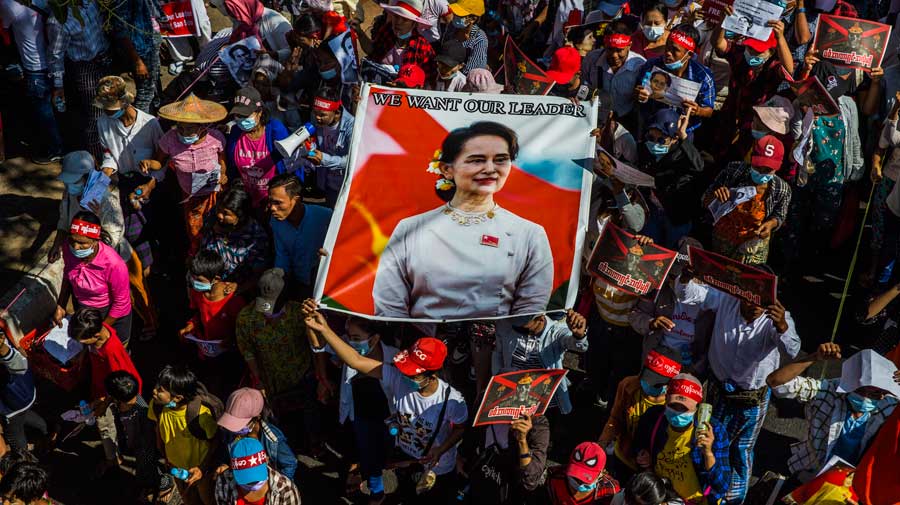Myanmar’s ousted leader Aung San Suu Kyi appeared at a court hearing via video conferencing on Monday as supporters marched in several towns and cities in defiance of a crackdown after the bloodiest day since the February 1 military coup.
Police fired tear gas and stun grenades to disperse hundreds of protesters in the main city of Yangon on Monday, witnesses said. They later combed through side streets firing rubber bullets and at least one person was hurt, media reported.
Suu Kyi, aged 75, looked in good health during her appearance before a court in the capital Naypyitaw, one of her lawyers said. Two more charges were added to those filed against her after the coup, she said.
“I saw Amay on the video, she looks healthy,” lawyer Min Min Soe told Reuters, using an affectionate term meaning “mother” to refer to Suu Kyi.
“She asked to meet her lawyer.” The Nobel Peace laureate, who leads the National League for Democracy (NLD), has not been seen in public since her government was ousted and she was detained along with other party leaders.
She was initially charged with illegally importing six walkie-talkie radios. Later, a charge of violating a natural disaster law by breaching coronavirus protocols was added.
On Monday, two more charges were added, one under a section of a colonial-era penal code prohibiting publication of information that may “cause fear or alarm”, and the other under a telecommunications law stipulating licences for equipment, the lawyer said.
The next hearing will be on March 15. Critics of the coup say the charges were trumped up.
Myanmar has been in chaos since the military seized power after alleging fraud in a November election won by the NLD in a landslide, with daily protests getting increasingly violent as police and troops try to stamp them out. On Sunday, the police fired on crowds in several places killing 18 people, the UN human rights office said.
A committee representing lawmakers elected last year said 26 people were killed but Reuters was unable to verify that. “We have to continue the protest no matter what,” Thar Nge said after police firing tear gas forced him and others to abandon a barricade in a Yangon street.
“This is my neighbourhood. It’s a lovely neighbourhood but now we’re hearing gunfire and we don’t feel safe.” The military has not commented on Sunday’s violence and police and military spokesmen did not answer calls.
The state-run Global New Light of Myanmar newspaper warned that “severe action will be inevitably taken” against “anarchic mobs”. Demonstrators marched on Monday in the northwestern town of Kale holding up pictures of Suu Kyi and live video on Facebook showed a crowd in the northeastern town of Lashio, chanting slogans.
The police and soldiers later raided a church in the town and detained 11 people, a church group said in a statement.
The coup brought a halt to Myanmar’s tentative steps towards democracy after nearly 50 years of military rule and has drawn condemnation from western countries and growing concern among its neighbours. Foreign ministers from the Association of Southeast Asian Nations (Asean), of which Myanmar is a member, will hold a video meeting on Myanmar on Tuesday and “listen to the representative of the Myanmar military authorities”, Singapore’s foreign minister, Vivian Balakrishnan, told parliament. Balakrishnan called for the security forces to desist from the use of lethal force, for Suu Kyi’s release and for talks on solutions and a way back to democratic transition.
US secretary of state Antony Blinken denounced what he called “abhorrent violence” by security forces, while Canada’s foreign minister, Marc Garneau, called the use of lethal force “appalling”. Tom Andrews, a UN special rapporteur, said it was clear the junta’s assault would continue so the international community should ratchet up its response. He proposed a global arms embargo, more sanctions on those behind the coup and on military businesses and a UN Security Council referral to the International Criminal Court.
“We must act,” Andrews said in a statement. The generals have for years shrugged off diplomatic pressure, partly because of the support of China and Russia. A Chinese foreign ministry spokesman urged Myanmar parties to keep in mind “the big picture” of development and stability and exercise restraint.











